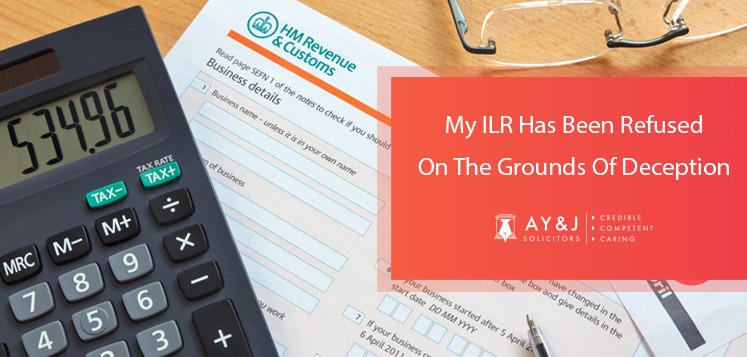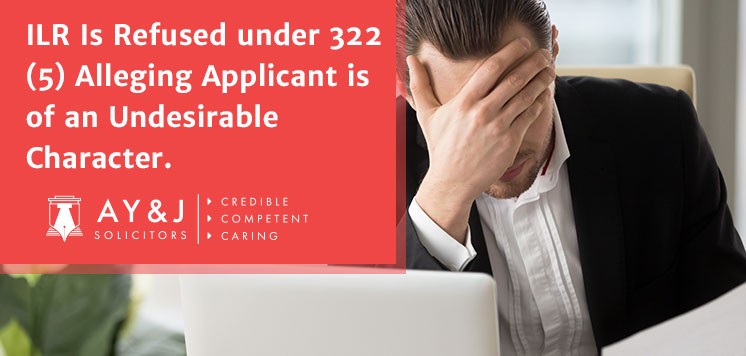Disclaimer: The information in this blog is accurate as of its publication date. Any updates after that date are not reflected here.
Submitting your Indefinite Leave Application (ILR) should provide a great sense of accomplishment and also an excitement that you are near to acquiring British Citizenship. But many applicants are instead receiving a rather upsetting response from UKVI, accusing them of deception.
There is no doubt that the British government has made it increasingly difficult over recent years for migrants to obtain ILR. For example, it is now a requirement that most non-EEA nationals who are on a Tier 2 visa when they apply for ILR, must earn at least £35,000 or above to qualify. Unfortunately, many migrants who have built their lives in the UK are facing refusals to ILR applications due to claims of deception (often under paragraph 322(2), 322(5) or 245CD (g), 19 (i) & 19(j)), or claims of insufficient/ discrepancy in the tax declaration to HMRC. This can mean an uncertain and frustrating delay in living an unrestricted life in the UK.
Table of Contents
How can ‘A Y & J Solicitors’ help with an alleged DECEPTION and REFUSED ILR applications?
It may seem frightening to be accused of deception / undesirable character, especially if the HMRC are involved. Such a refusal may trigger an investigation into your affairs by tax authorities. Rest assured, you are not the only person experiencing this setback. There is hope, and an opportunity to successfully apply for ILR is still available to you if you take the right steps in resolving this challenge:
- If you are overwhelmed, confused, or unable to handle this roadblock to citizenship, get help.
- Contact the immigration law experts at A Y & J Solicitors for the best approach to defending your application and to improve the chance of reversing the refused ILR decision.
What is an example of an ILR refusal alleging deception or bad/undesirable character?
The official guidelines state a false representation, which can lead to a refusal of an ILR application under paragraph 322(1A), 322(2), 322(5) or 322(2A), refers to a case where the applicant or a third party “deliberately and dishonestly makes a false statement in relation to an application.”
The requirement that the false statement must be made ‘deliberately and dishonestly’ comes from the case of AA (Nigeria) v SSHD. Here, the Court of Appeal examined what was meant by the words ‘false representation’. In giving the lead judgment, Lord Justice Rix held that ‘false’ could mean ‘incorrect’ or ‘dishonest’. The Immigration Minister at the time, Liam Byrne, argued that for the purposes of the Immigration Rules, making an incorrect statement should count as false. This would have meant applications could be refused simply because the person submitting them made a mistake (something easy to do if you are filling in official forms in your second language). However, the Court of Appeal stated that the term ‘false representation’ had to contain a level of deliberate dishonesty on the part of the applicant. Lord Justice Rix stated:
“In my judgment, however, it would be grotesque to ascribe to the Secretary of State an intention to use “Deception” to mean something lacking in dishonesty.”
An example of why this definition of ‘false representation’ is so important can be illustrated by a recent case our firm dealt with. A gentleman was refused ILR although he had been continuously living and working in the UK for the past five years. There was an error on his most recent tax return, which meant that the income he had claimed on his ILR application was different than the income reported to HMRC. UKVI accused him of deception and refused his ILR. However, because there had not been a deliberate dishonesty on the part of our client, we were able to have the error corrected. We then resubmitted our client’s ILR application which resulted in a settlement being granted.
We see many cases like this whereby honest people are refused ILR because of an error made on their tax return, resulting in an earnings discrepancy on their ILR application. Fortunately, our team has an in-depth understanding of the process and can assist in rectifying the error and ensuring our clients achieve a settlement.
You can read the most recent information about the government’s stance on ILR refusals here.
What should I do if my ILR is refused due to an allegation of deception?
If your application for ILR has been refused under paragraph 322(1A), 322(2), 322(5) or 322(2A) on the grounds of deliberately and dishonestly making a false statement, you may need to take the following steps:
- Contact your professional advisers (i.e. your lawyer and accountant) as quickly as possible.
- Take any necessary action to correct your tax return, if there was an error.
- If applicable pay any taxes that are owed.
- Keep records of all documents and actions you take, as well as any responses from HMRC.
- Request an administrative review of your ILR application via post. Include as much evidence and documentation as possible to support your case. Include any adjusted tax returns, letters from your solicitor and accountant indicating actions taken to correct errors, and any other information that supports your position.
- If your error was unintentional, then it is recommended that you demonstrate with relevant documentary evidence the cause of the genuine error and what actions you took to correct the error.
How can A Y & J Solicitors assist if your application for ILR has been refused on the grounds of making a deliberate and dishonest statement?
Call us at +44 20 7404 7933, or email us at contact@ayjsolicitors.com. We have helped many people just like you get their ILR application approved – even after a refusal.
Our immigration specialists are passionate about helping each client succeed in their ILR applications, and will go the extra mile for your case. We understand the law surrounding refusals under paragraph 322(1A), 322(2), 322(5) or 322(2A) and will provide you with expert legal advice and representation.
Disclaimer: No material/information provided on this website should be construed as legal advice. Readers should seek an appropriate professional advice for their immigration matters.










